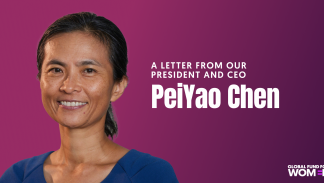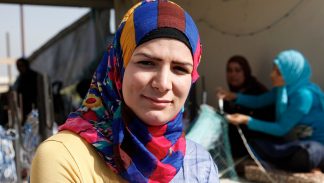Marta Alicia Alanis
Marta Alanis has been an activist for abortion rights since 1991, when she started Catholics for Choice in her city, Cordoba, Argentina. Though she is now widely known for her work on abortion rights, the issue is highly stigmatized. “At first, it was hard to take on abortion publicly,” she says. “It was a personal process of realizing that to fight for the right to abortion was to fight for a just cause.”
She began her work researching abortion among Catholic women, and met with women to talk about issues like sexuality, reproduction, and the church’s stance on these topics. In one discussion, Marta remembers talking to 20 Catholic women, and learning that fourteen of them had had abortions. “In Catholic circles, abortion is not discussed, so it seemed very positive that they could talk about it. In part, that was an achievement of the people who were working there, and showed a level of trust for them to be able to say they had had abortions in front of their neighbors,” says Marta Alicia.
Marta and her organization are fighting for safe and legal abortion in Argentina, but are often met with huge social and political roadblocks. Abortion is limited in Argentina, and most women face extreme economic barriers to obtaining one. Women often seek out alternative—and unsafe—options when they want to terminate a pregnancy. Around 50,000 women a year are admitted to the hospital as a result of unsafe abortions, and about 100 women die each year. Additionally, abortion is only one part of the issue; sex education and access to contraception are not prioritized, putting many girls and women at risk for unwanted pregnancies.
Besides the fact that it is difficult to obtain, abortion is also highly stigmatized for religious reasons. About 75% of Argentinians identify as Roman Catholic, and the Catholic Church is a strong political player in Argentina.
The social stigma and lack of public policy supporting sex education and reproductive health can be frustrating for Marta; however, there have been gains. The public health system now treats poor women, and half of all public hospitals attend to women seeking legal abortions in the case of rape or if the mother’s life is at risk. People talk more openly about abortion and contraception, and the media has also increased its abortion news coverage. Still, opposition to Marta’s work is fierce; some groups have tried to take away Catholics for Choice’s legal registration and funding. Their struggle for free, safe, and legal abortion for women continues.
Part of Marta’s activism is to encourage conversation among Catholic women in Argentina about the church’s view on sexuality and reproduction, and to show the difference between the church’s stance and women’s real life experiences. “It’s exposing these conservative sectors, and differentiating very clearly between the discourse of the church hierarchy and the ultra-Catholic groups, and what life is really like for Catholic women and couples,” says Marta.
For Marta, abortion is inextricably linked with motherhood—a role she believes women must be able to choose for themselves. “When we talk about abortion, we’re talking about motherhood. If women could choose abortion, they would gain the ability to freely choose motherhood. And I think that motherhood is very important in women’s lives. Women should be able to choose to become mothers. It shouldn’t be imposed on anyone by lack of access to sex education or contraceptives, or fate, or simple bad luck,” she says. “Motherhood by choice benefits all of society.”
#DearDefendHer
Show Marta and women human rights defenders around the world that you stand with them! Sign our #DearDefendHer solidarity statement today.
Women should be able to choose to become mothers. It shouldn’t be imposed on anyone by lack of access to sex education or contraceptives, or fate, or simple bad luck.”Marta Alicia Alanis


